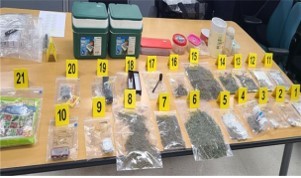[Newsmaker] Juvenile drug cases on the rise
Drug arrests up 8.6% in H1; 156.5% for juveniles
By Shin Ji-hyePublished : Aug. 10, 2021 - 17:50

Drug cases are on the rise in South Korea, with a marked surge in the number of juveniles arrested on drug charges, officials said Tuesday.
According to government data, 7,565 people were arrested on drug charges and 1,138 people were imprisoned for drug offenses between January and June. Drug arrests rose 8.6 percent from the same period last year. The number of drug arrests stood at 12,613 in 2018, 16,044 in 2019 and 18,050 in 2020.
The crackdown was carried out by the Ministry of Food and Drug Safety, the Supreme Prosecutors’ Office, the Korea Customs Service, the National Police Agency and the Korea Coast Guard.
The use of psychotropic drugs increased by about 177 percent, with cannabis use up about 227 percent.
Most worrisome is the surge in juvenile drug cases. The number of drug arrests involving people under the age of 19 stood at 277 in the first half, up 156.5 percent year-on-year. The number of juveniles arrested on drug charges was 119 in 2017, 143 in 2018, 239 in 2019 and 313 in 2020.
As hospitals and clinics write prescriptions without thorough verification procedures, fentanyl -- a powerful opioid used as a pain medication -- is rapidly spreading to teenagers online and through social media, experts say. As of last year, fentanyl was the second-most-consumed medical narcotic anesthetic, after propofol.
In May, about 40 teenagers were accused of distributing and using fentanyl patches after having received prescriptions at hospitals.
Many drugs were distributed via the dark web or social media due to the coronavirus pandemic. The number of cases where drugs were intercepted from international mail and special delivery shipments increased by about 283 percent compared with the same period last year.
“We will strengthen international cooperation with foreign investigators to eradicate smuggling while further strengthening cooperation between regulators to block illegal drug distribution,” said Jang Sang-yoon, head of the social coordination office at the Office for Government Policy Coordination.
“In the second half, we will do our best to create an environment where people can live safely from drugs by pushing for more intensive crackdowns.”
On April 20, Korea was elected as a member of the United Nations Commission on Narcotic Drugs at a meeting of the UN Economic and Social Council. Its term is set to begin in 2022 and end in 2025.







![[Graphic News] More Koreans say they plan long-distance trips this year](http://res.heraldm.com/phpwas/restmb_idxmake.php?idx=644&simg=/content/image/2024/04/17/20240417050828_0.gif&u=)
![[KH Explains] Hyundai's full hybrid edge to pay off amid slow transition to pure EVs](http://res.heraldm.com/phpwas/restmb_idxmake.php?idx=644&simg=/content/image/2024/04/18/20240418050645_0.jpg&u=20240419100350)






![[From the Scene] Monks, Buddhists hail return of remains of Buddhas](http://res.heraldm.com/phpwas/restmb_idxmake.php?idx=652&simg=/content/image/2024/04/19/20240419050617_0.jpg&u=20240419175937)

![[KH Explains] Hyundai's full hybrid edge to pay off amid slow transition to pure EVs](http://res.heraldm.com/phpwas/restmb_idxmake.php?idx=652&simg=/content/image/2024/04/18/20240418050645_0.jpg&u=20240419100350)

![[Today’s K-pop] Illit drops debut single remix](http://res.heraldm.com/phpwas/restmb_idxmake.php?idx=642&simg=/content/image/2024/04/19/20240419050612_0.jpg&u=)